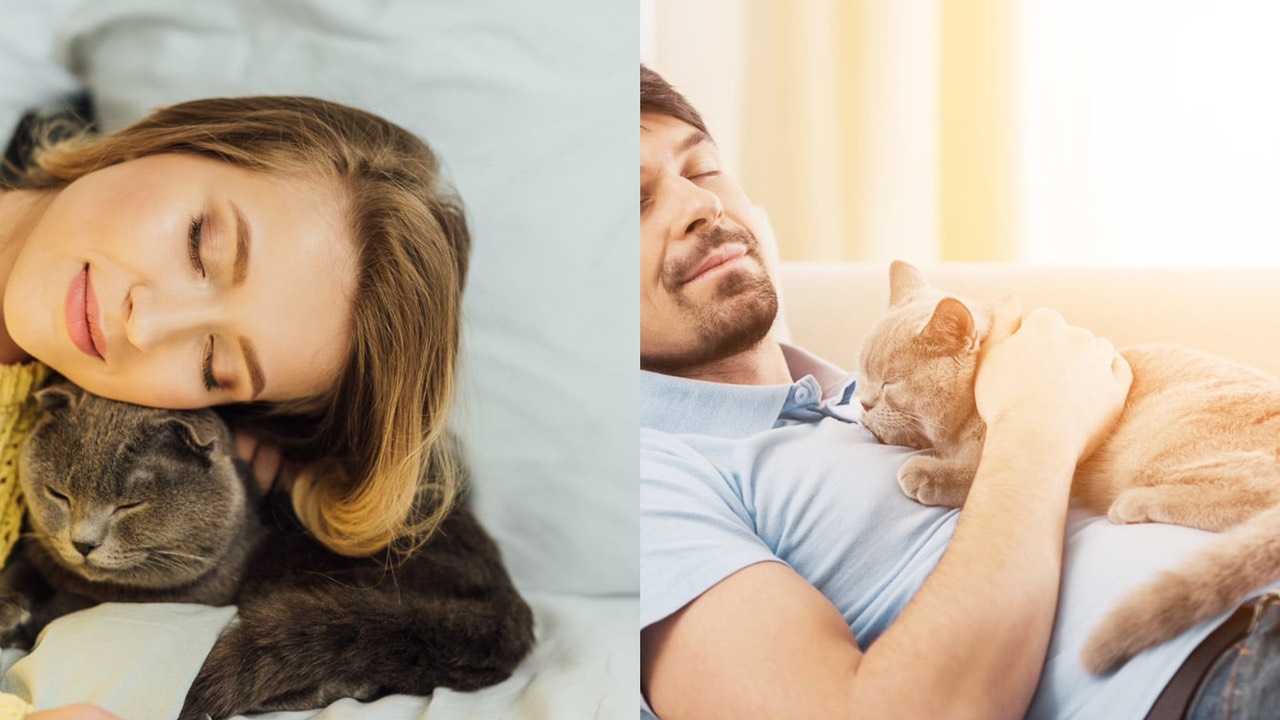
Many cat lovers would agree that having your cat sleep next to you feels like you’ve hit the jackpot and are being showered with love. But have you ever wondered, “why do cats sleep next to their owners rather than in their own bed?”
Well, there are many reasons for cats’ sleeping positions and behaviors. You might find your fur baby snoozing next to you because they trust you, or they could simply be seeking warmth.
To help you understand your cat’s behavior a little better, I’ve put together a list of the most common reasons why cats sleep next to their owners.

Image by Adam Kuylenstierna on Unsplash
While we all appreciate kitty cuddles, and accept them without question it’s natural to wonder why cats do what they do. Here are the most common reasons why your cat is sleeping with you.
As cats love warmth, you’ll often find them soaking up the sunshine during the day and sleeping in a cozy spot. Similarly, when there’s no sunlight to snooze in, cats cuddle up with their owners for the warmth of their bodies.
Have you ever noticed your cat snuggled up near your head? A possible reason for this is that most of our body heat escapes from there and is likely to be uncovered. So your cat might cuddle up beside your head for the best source of warmth and also be comforted by the natural smells of its owner’s hair.

When cats sleep, they are vulnerable and have a natural survival instinct to protect themselves from potential predators. You might find cats sleeping in a ball to protect vital organs, or they might seek security from their owners.
Sleeping near their owners can make cats feel a sense of safety and indicates trust in the relationship. So if your kitty is sleeping next to you, it can mean that it trusts you to provide an extra layer of defense.

Whether you buy the comfiest cat bed or donut cushions, cats sleep where they want to, and they might find a spot on their owner’s bed and seek comfort.
Felines have an impressive sense of smell, it’s 14 times better than that of humans. Additionally, cats do not appreciate loud or sudden noises.
With sensitivity towards smells and sounds, cats might sleep near their owners as they are familiar with their scents and sounds. For instance, the sound of your beating heart, breathing, or snoring (yes, we all do it from time to time) can have soothing effects and make your fur baby feel safer and connected to you.
Image by Paul Hanaoka on Unsplash
As territorial animals, felines often claim territory through particular behavior, like rubbing their head on household objects, walking on items, or headbutting their owners.
Cats leave their mark using scent glands on their footpads, face, cheeks, tail, and with urine. For example, you might see your cat walking around on your bed, which can signal that they are marking it as their own through the pheromones released from the tiny glands on their feet.
And if your cat gives you the occasional headbutt while lying on your bed, they’re marking their beloved owner as their territory.

Cats show affection in several ways, from greeting you at the door and meowing to slow blinking and purring. Sleeping with you is another way cats display appreciation and a desire to be near you.
If you’re away for a couple of hours, your fur baby might show you how much they missed you by following you and settling down next to you for a snooze.

Although cats are pretty independent creatures, they can feel lonely if they are left unattended for extended periods. Cats are not pack animals like dogs, but they do enjoy companionship and spending time with their owners.
So, if your cat is sleeping close to you, take a moment to soak up that honor.

Cats sleep next to their owners because they adore and trust them. If you take good care of your fur baby by giving them tons of attention and affection, they’ll show their love and appreciation by cuddling up with you.
Like many other pets, your kitty might bond more closely with one member of the family. And if you notice that your cat sleeps near one partner, you’ll know who is the victorious one.

Image by Kate Stone Matheson on Unsplash
There are several pros and cons to cats sleeping near their owners. The upside to inviting your fur baby to sleep in your bed is that it strengthens the bond and makes them feel warm, safe, and secure. Petting your snoozing cat can also help to reduce stress and anxiety.
For allergy sufferers, having your cat on your bed means fur gets left behind, which triggers allergies and you’ll have to change your sheets regularly. Another downside is that some cats are more active at night, which could disturb your sleep. If you’re a light sleeper, an energetic kitty jumping off the bed might not be ideal.
However, if you’re up for a little company and morning cuddles from your kitty, sleeping with them can be a blast. Ultimately, having your cat sleep with you can be a delightful experience depending on both preferences and sleeping habits.

Image by Huy Phan on Unsplash
With cats’ adorable appearance and quirky traits, many people are head over heels for their feline friends. Cats sleep around 12-16 hours a day, and if they choose to spend some of that time with you, it’s an honor.
So next time your cat starts purring and finds a comfy spot near you, enjoy the extra warmth while you watch your peaceful sleeping cat dream.

If you want to learn more about your kitty’s behavior during nap time, have a look at this guide on why cats cover their faces while sleeping.
Related Posts



